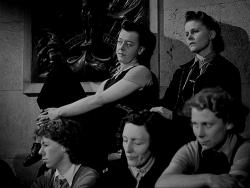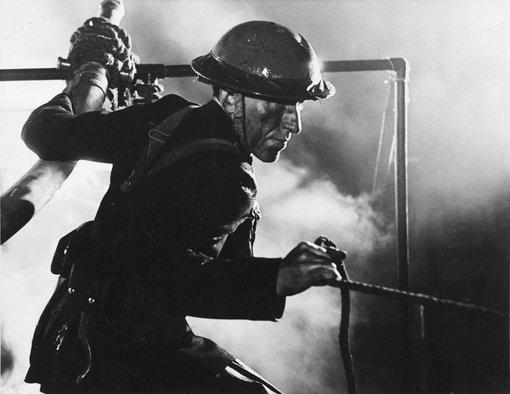Like many 20th-century Britons, the documentarist Humphrey Jennings was inspired to do his greatest work by World War Two. The crisis elicited not only his genius as a poetic propagandist but as an unofficial sociologist who demonstrated that the class struggle and ingrained cultural differences, if irresolvable, were not necessarily an impediment to the collective effort of beating Hitler.
The films on the second of the BFI’s three DVDs of Jennings’s total output date from 1941-3 and describe an evolution from morale-boosting montages of primarliy static images (give or take the odd dolly or pan) to more complex narratives that incorporate fictional elements and introduce action. In the first category are three films. The Heart of Britain (nine minutes) stirringly presents an industrialised populace – nostalgic for its rural past – which “can’t be beaten” and is proud of its “power to hit back”. Sadly dated, Words for Battle (eight minutes) contrasts footage of the Nazi command with that of British children gambolling in the green and pleasant land and has Laurence Olivier quoting from Milton, Blake, Browning, Kipling, Churchill, and the Gettysburg Address as armoured cars roll past the Lincoln statue in Parliament Square.
Infinitely better is the celebrated Listen to Britain (20 minutes), which merges the sounds of 1942 – Spitfires, locos, larks, farm horses, industrial noises, music from the dancehall and the playground – into a polyphony of a nation cheerfully at war. Flanagan and Allen performing in a works canteen are juxtaposed to the Jewish pianist Myra Hess playing a lunchtime concert in front of Queen Elizabeth (who returned for retakes), Kenneth Clark, and the public (pictured below right) in the artless National Gallery. Elsewhere, a factory worker sings “Yes My Darling Daughter” at her machine.
 The two semi-fictional films, both from 1943, are masterpieces. In the Griersonian people-at-work tradition, Fires Were Started (65 mins), staged after the Blitz, depicts a comradely East End auxiliary crew (played by real firemen) trying to stop a docks blaze spreading to a munitions ship; the selfless, laconic Jacko dies after saving others.
The two semi-fictional films, both from 1943, are masterpieces. In the Griersonian people-at-work tradition, Fires Were Started (65 mins), staged after the Blitz, depicts a comradely East End auxiliary crew (played by real firemen) trying to stop a docks blaze spreading to a munitions ship; the selfless, laconic Jacko dies after saving others.
Unfazed by being hit by a blast, one of the unflappable women in the control room resumes her phone call, ignoring the blood on her forehead. The film eschews sentimentality, but it’s not humourless: the scene in which an upper-class copywriter is integrated into the brigade when he hammers out “One Man Went to Mow” on a piano as each bloke reports for duty is glorious.
Jennings followed it with The Silent Village, his homage to the Czechoslovakian mining village Lidice, which had been obliterated by Hitler in 1942 – its men shot, its women and over a hundred children sent to concentration camps – in revenge for the assassination of Reinhard Heydrich in nearby Prague. Jennings elliptically restaged these events in Cwmgiedd, a South Wales mining village, with locals playing the parts of the colliers and their families. The mostly unseen Nazis proceed from banning Welsh to lining the local men up against a graveyard wall. By the end, Cwmgiedd and Lidice have become symbiotic. Although Jennings was honouring Lidice’s dead, he was also saying a similar catastrophe could happen in the valleys – and this is why we fight.
Watch a clip from Listen to Britain















Add comment